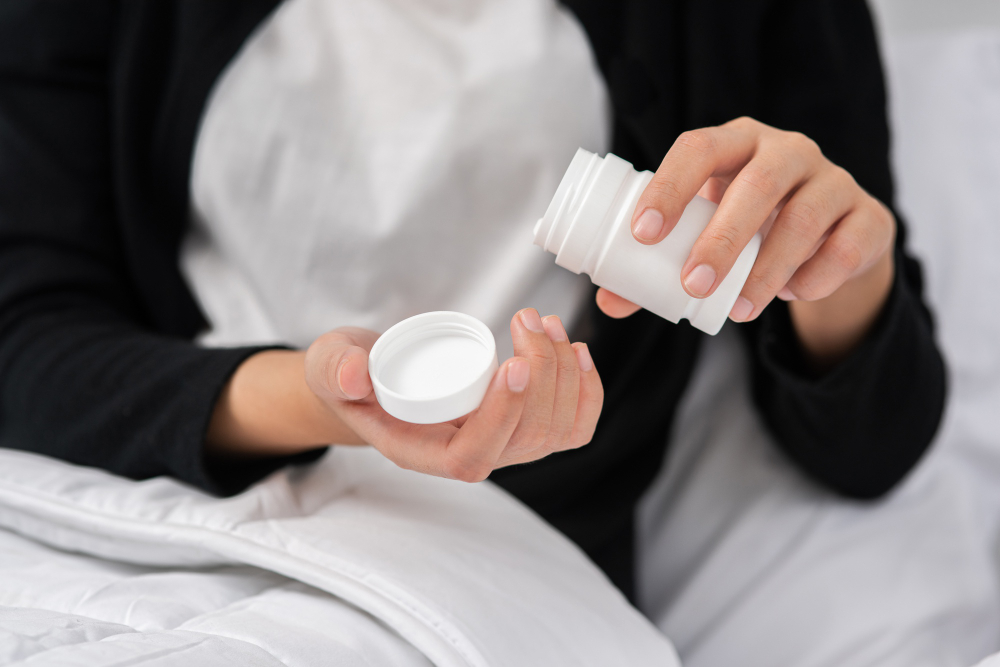What to Expect from Hormone Replacement Therapy
- , Hormones


Caroline Hedges
Caroline Hedges is a critically acclaimed researcher, writer and serial entrepreneur.
With a knack for making the obscure plain, she is able to distill her research
in writing both fun and engaging posts.

Anyone can encounter hormonal problems at any time, but usually, it will affect women going through menopause. Hormonal problems can lead to severe health issues, so treatment is almost always necessary. If you are experiencing any hormonal imbalances, the hormone replacement therapy option is always at your disposal.
What Is Hormone Replacement Therapy?
Hormone replacement therapy, also known as estrogen replacement therapy (ERT) or menopausal hormone therapy (HRT), is a medicine that contains female hormones called estrogen. Usually, hormone therapy is used by women going through menopause to treat menopausal symptoms.
How Hormone Replacement Therapy Works
Hormone therapy has the mission of balancing the hormones in your body. No matter how hormones enter your body, they will regulate and relieve you of different menopausal symptoms. Before settling on a hormone treatment, you first have to meet with your doctor for a consultation. Your doctor can identify and tell you which hormone is causing the imbalances in your body. For example, if you lack estrogen or your natural progesterone levels are off, you can opt for hormone replacement therapy.
What Are the Types of Hormone Replacement Therapy?
Systemic Estrogen Therapy
The first of the hormone therapies is Systemic Estrogen Therapy (SET). This treatment comes in pills, gel, spray, cream, rings, or an estrogen patch that contain higher doses of estrogen that will get absorbed through your skin. The doses of estrogen will regulate your hormonal imbalances and treat the uncomfortable symptoms of menopause. This treatment also prevents osteoporosis, an illness that weakens the bones.
Estrogen and Progesterone Therapy (Combination Hormone Therapy)
As the name suggests, the second hormone replacement treatment is estrogen and progesterone. Estrogen and progesterone are combined in this treatment for women experiencing troubles with both hormone levels through menopause.
What Are the Requirements for Hormone Replacement Therapy?
You have to follow a few guidelines before signing up for hormone therapy.
Age
This detail is the most crucial of them all. Under no circumstance should a woman begin hormone replacement therapy if she is older than 60 or ten years after menopause. Beginning hormone therapy at this age can worsen the risks of the treatment.
Doctor's Approval
Before beginning hormone replacement therapy, you must receive your doctor’s approval. They are the only ones that can approve and guide you toward a suitable treatment. Then, after a thorough consultation, medical tests, and assessing your personal medical history, they can pinpoint the right hormone therapy for you.
Medical Conditions
Some medical conditions can stop you from undergoing hormone replacement therapy. Therefore, it is essential to consult your doctor and take some medical tests before undergoing hormone therapy. In addition, some medical problems can worsen if you undergo hormone replacement therapy.
What Are the Benefits of Hormone Therapy?
Menopausal Hormone Therapy for Menopausal Symptoms
The main reason women take hormone therapy is to combat the menopausal symptoms, such as:
- Reduced sex appeal;
- Vaginal dryness;
- Mood swings.
Women choose to fight these menopausal symptoms with menopausal hormone therapy, although they can pass after a couple of years. The menopausal symptoms can be quite unpleasant and sometimes even painful.
Hormone Therapy and Weight Loss
Menopausal hormone therapy can influence your body weight. Estrogen levels have a direct link with the body’s weight, and if you are experiencing a decrease in estrogen, you are likely to put on some weight. Conversely, undergoing a menopause treatment that regulates your estrogen levels will result in losing weight as your hormone levels turn back to normal.
Male Pattern Hair Loss and Female Pattern Hair Loss
Hormone imbalances, especially estrogen, can lead to alopecia. This symptom can occur because estrogen levels substantially diminish when going through menopause. Men are not excluded from this subject, as the male body also contains estrogen, but not in such high quantities as the female body does.
Menopausal Hormone Therapy for Hot Flashes
Hot flashes, severe hot flashes, and night sweats are common symptoms of irregular hormone levels, primarily through the menopausal transition. Menopausal hormone therapy is a very effective treatment for these symptoms. Usually, if you are experiencing menopause, changes in your lifestyle don’t diminish hot flashes and night sweats. This is why menopausal hormone therapy is the best answer.
Hormone Therapy for Vaginal Dryness and Painful Intercourse
It is only natural to experience vaginal dryness and slightly uncomfortable intercourse during menopause because the imbalance of hormones causes the vaginal tissue to become thinner and more easily irritated. This is a typical menopausal symptom that hormone therapy can treat.
Hormone Therapy for Endometrial Cancer and Breast Cancer
Hormone therapy has its risks, but this is the case with all medications and treatments. There is a slight increase in breast cancer and endometrial cancer risk when taking hormone therapy, but nothing significant. This depends from person to person, but the advantages outweigh the risks.
Does Hormone Replacement Therapy Cause Abnormal Vaginal Bleeding?
Hormone therapy may result in monthly light bleeding. The bleeding can also resemble a standard period and sometimes confuse women undergoing menopause. The combination of estrogen and progesterone can cause different side effects, such as vaginal bleeding. However, vaginal bleeding is nothing to be afraid of, as this symptom is typical during menopause.
Does Hormone Therapy Cause Abnormal Breast Tenderness?
Estrogen is the primary hormone linked to feminine characteristics such as breasts and pubic hair. Therefore, hormone therapy may cause more tender breasts, especially in older women. However, if a woman is experiencing tender breasts before hormone therapy, the treatment relieves her of this symptom. It’s a whole paradox!
Talk to MedHealth 360 about Your Personalized Hormone Replacement Treatment!
If you think you need hormonal therapy, MedHealth 360 will provide you with the most qualified and best-trained team of experts. We provide a broad range of hormonal treatments, such as bioidentical hormone therapy. The team led by Dr. Phillip Chang will help you achieve your goals.
If you want to inform yourself, the MedHealth 360 blog will provide everything you want to know. We are always here to help you, so don’t hesitate to contact us!



